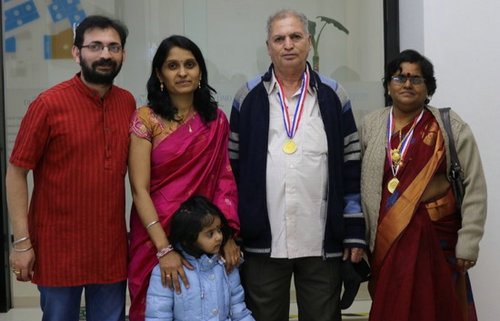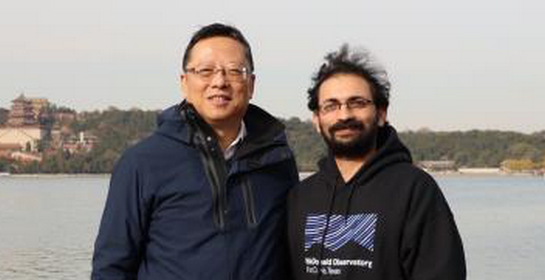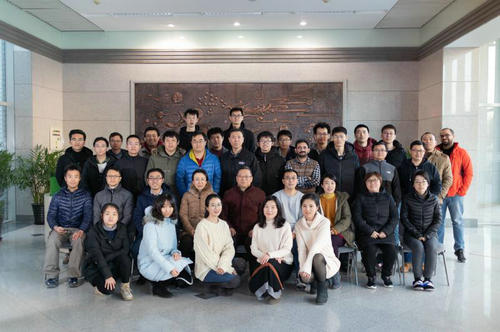I am Bharat Kumar Yerra, hailing from the southern part of India, an astronomer solving stellar puzzles from starlight through telescopes. I reached Beijing along with my wife, in 2014, to join Prof. Gang Zhao’s research group at National Astronomical Observatories, Chinese Academy of Sciences (NAOC). I have been in China for six years altogether, with two years as PIFI fellow at NAOC and now a LAMOST fellow at NAOC itself. My wife has completed her Ph.D. researching the Sun at NAOC. My little daughter, who was born in 2016 in Beijing, is now going to her Pre-K school in Beijing itself. My stay in Beijing helped me to bring in my parents and stay all together as a completely united family. In fact, we created a home away from home.

My family and me at Beijing
For me, living in Beijing definitely serves as a good base. I am having a lustrous life in Beijing and I am thankful to my advisor Prof. Zhao for giving me an opportunity to be here. His support has helped me to grow academically and personally. Prof. Zhao is a great researcher and administrator and has been very friendly, active, and supportive professionally and personally, which enabled me to perform fruitful research and stay comfortably in Beijing with my family. Prof. Zhao's vision is amazing that led to successful long term research projects and many collaborative bilateral projects. The best part by making us involved in these projects, was that, it made me to learn to work in bigger groups with researchers from multiple countries.

Prof. Gang Zhao and me
During my initial stay, the most difficult thing that I found personally was the language, as it was little difficult to learn and practice. But later, I found that if you intend to study and stay in China for long, then you must know the basics to find your way around and also enrich your learning. This problem also got solved in a few months because NAOC introduced Chinese Classes for Foreigners and I was able to communicate with local people for my very basic needs. I could use the language that I learned from my Chinese classes at restaurants and this helped me a lot in relishing over the diverse Chinese cuisines (seafood to noodles and from spicy to sweet) in Beijing. My little knowledge of Chinese has also helped me to explore the various surrounding places in and around Beijing.
My academic colleagues have been my life supporters in Beijing. Each and every person in my group has helped me in one way or the other for which I am thankful from the bottom of my heart. My dear colleagues Ms. Qi Zhang, Dr. Yujuan Liu, and Dr. Xiangsong Fang and Dr Fei Zhao have helped me and my wife personally and I have no words to express my heartfelt thanks to all of them. One of the student Jicheng Zhang was available to me even at midnight for my hospital needs. I am also thankful to my office A430 mates (Xiangsong, Lei, Cheng, Jiyeon, Sarah & Sofya) for being readily available for all the discussions that we had, formal and informal ones and also for all the timely helps that you guys rendered to me as and when needed. Last but not least, people in Beijing are a very nice, humble, down to earth, friendly, and got a helpful nature that made us feel at home.
On the scientific front, I have been very productive in my research, authoring/co-authoring more than twenty articles in peer-reviewed international journals. This includes our recent discovery of ubiquitous lithium production in low-mass stars that was published in Nature journals. Acknowledging the funding support from CAS and NSFC and special mention to fellow scientists in our group who made me comfortable and enjoy working with them, are Prof. Yuqin Chen, Prof. Jingkun Zhao, Dr. Haining Li, Dr. Yujuan Liu, Dr. Xiangsong Fang, Dr. Xiaoming Kong, Dr. Yudu Bu, Dr. Jicheng Zhang and Ms. Sunayana Maben. Special thanks to Xinglong Station of NAOC for operating an excellent optical observing facility called LAMOST, whose starlight allowed me to progress my research on stars in the Milky Way.

With my colleagues at NAOC
NAOC also provides access to get starlight from various world-class telescope facilities through dedicated programs, which allows them to perform cutting edge research in astrophysics. NAOC is a hub for astrophysics and astronomy in China wherein the researcher's work ranging from planetary science through stars to black holes. The coffee room is the best place where we get to meet researchers from diverse fields and have healthy discussions on current science topics with hot coffee in hand. NAOC hosts colloquiums every week throughout the year, inviting experts from various institutions in China and abroad that allow us to know the latest advances in research.

Address: 20A Datun Road, Chaoyang District, Beijing, China code: 100012
Tel: 010-64888708 E-mail: naoc@nao.cas.cn

